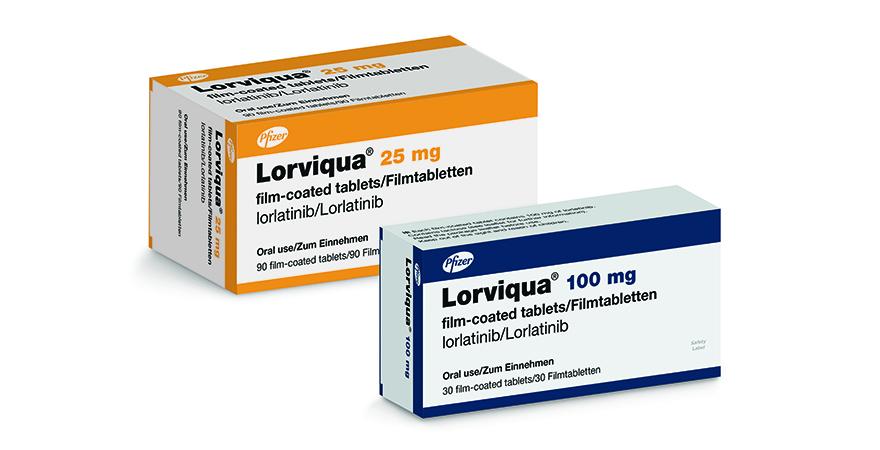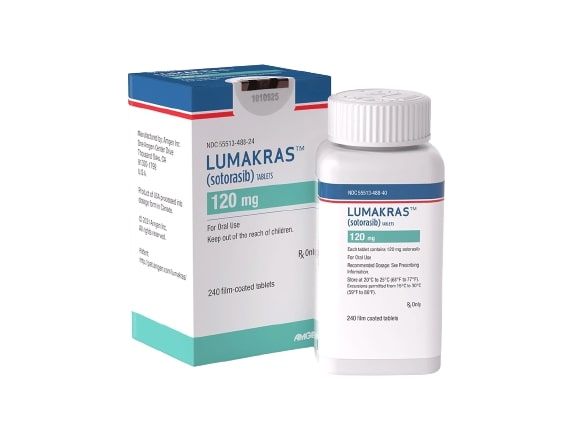Lorviqua (lorlatinib) vs Lumakras (sotorasib)
Lorviqua (lorlatinib) vs Lumakras (sotorasib)
Lorviqua (lorlatinib) and Lumakras (sotorasib) are targeted therapies used to treat non-small cell lung cancer (NSCLC), but they act on different genetic mutations within the cancer cells. Lorviqua is a third-generation anaplastic lymphoma kinase (ALK) inhibitor designed for patients whose NSCLC tumors have specific ALK gene mutations and is typically used after other ALK inhibitors have failed. In contrast, Lumakras is the first approved therapy targeting the KRAS G12C mutation and is suitable for patients whose tumors have this specific mutation, representing a new option for a historically difficult-to-treat oncogenic driver. Patients should consult with their healthcare provider to determine which medication is appropriate for them, based on their individual tumor genetics, prior treatments, and overall health status.
Difference between Lorviqua and Lumakras
| Metric | Lorviqua (lorlatinib) | Lumakras (sotorasib) |
|---|---|---|
| Generic name | lorlatinib | sotorasib |
| Indications | ALK-positive metastatic non-small cell lung cancer (NSCLC) | KRAS G12C-mutated NSCLC |
| Mechanism of action | ALK and ROS1 tyrosine kinase inhibitor | KRAS G12C inhibitor |
| Brand names | Lorviqua | Lumakras |
| Administrative route | Oral | Oral |
| Side effects | Hypercholesterolemia, hypertriglyceridemia, edema, weight gain, peripheral neuropathy | Diarrhea, musculoskeletal pain, nausea, fatigue, liver damage |
| Contraindications | Severe hypersensitivity to lorlatinib | Severe hypersensitivity to sotorasib |
| Drug class | Tyrosine kinase inhibitor | Small molecule kinase inhibitor |
| Manufacturer | Pfizer | Amgen |
Efficacy
Lorviqua (lorlatinib) Efficacy in Lung Cancer
Lorviqua, also known as lorlatinib, is a medication specifically designed to treat patients with non-small cell lung cancer (NSCLC) that is anaplastic lymphoma kinase (ALK)-positive and has progressed despite earlier targeted therapies. As a third-generation ALK inhibitor, lorlatinib has shown significant efficacy in patients with advanced ALK-positive NSCLC, including those who have brain metastases. Clinical trials have demonstrated that lorlatinib can provide substantial benefit in terms of response rate and progression-free survival. Its ability to cross the blood-brain barrier makes it particularly effective in treating central nervous system metastases, a common complication in ALK-positive NSCLC patients.
Lumakras (sotorasib) Efficacy in Lung Cancer
Lumakras, known generically as sotorasib, is a novel medication approved for the treatment of NSCLC with a specific mutation known as KRAS G12C. This mutation is found in a subset of patients with NSCLC and has historically been considered 'undruggable'. However, sotorasib has emerged as a promising treatment option for these patients. Clinical trials have shown that sotorasib can lead to significant tumor shrinkage and prolonged progression-free survival in patients with KRAS G12C-mutated NSCLC. The drug's efficacy has been particularly noteworthy given the lack of effective treatments for this challenging mutation in the past.
Both Lorviqua and Lumakras represent a shift towards precision medicine in the treatment of lung cancer, where therapies are tailored to target specific genetic alterations in the tumor. The efficacy of these drugs underscores the importance of genetic testing in patients with NSCLC to identify those who may benefit from these targeted treatments. The use of Lorviqua and Lumakras is a testament to the advancements in understanding the molecular underpinnings of lung cancer and developing therapies that can exploit these vulnerabilities for improved patient outcomes.
It is important to note that while both Lorviqua and Lumakras have shown efficacy in treating certain populations of lung cancer patients, their use is contingent upon the presence of specific genetic alterations. Therefore, their application is not universal for all lung cancer cases but rather limited to those with the corresponding molecular profiles. As research continues, these medications may also be studied for potential off-label uses or in combination with other treatments to enhance their efficacy or to treat a broader range of patients.
Regulatory Agency Approvals
Lorviqua
-
European Medical Agency (EMA), European Union

-
Food and Drug Administration (FDA), USA

-
Health Canada

-
Therapeutic Goods Administration (TGA), Australia

Lumakras
-
European Medical Agency (EMA), European Union

-
Food and Drug Administration (FDA), USA

-
Medicines & Healthcare products Regulatory Agency (MHRA), United Kingdom

Access Lorviqua or Lumakras today
If Lorviqua or Lumakras are not approved or available in your country (e.g. due to supply issues), you can access them via Everyone.org.
How it works

Make an enquiry
Choose the medicine you want to buy, answer a couple of questions, and upload your prescription to speed things up. We’ll get back to you within 24 hours.


Make an enquiry
Choose the medicine you want to buy, answer a couple of questions, and upload your prescription to speed things up. We’ll get back to you within 24 hours.


Breeze through the paperwork
We'll guide you through the required documents for importing unapproved medicine, ensuring you have all the necessary information.


Get a personalized quote
We’ll prepare a quote for you, including medicine costs and any shipping, administrative, or import fees that may apply.


Receive your medicine
Accept the quote and we’ll handle the rest - sourcing and safely delivering your medicine.

Some text on this page has been automatically generated. Speak to your physician before you start a new treatment or medication.
Let's talk
If you have any questions, call us or send us a message through WhatsApp or email:
Contact us




